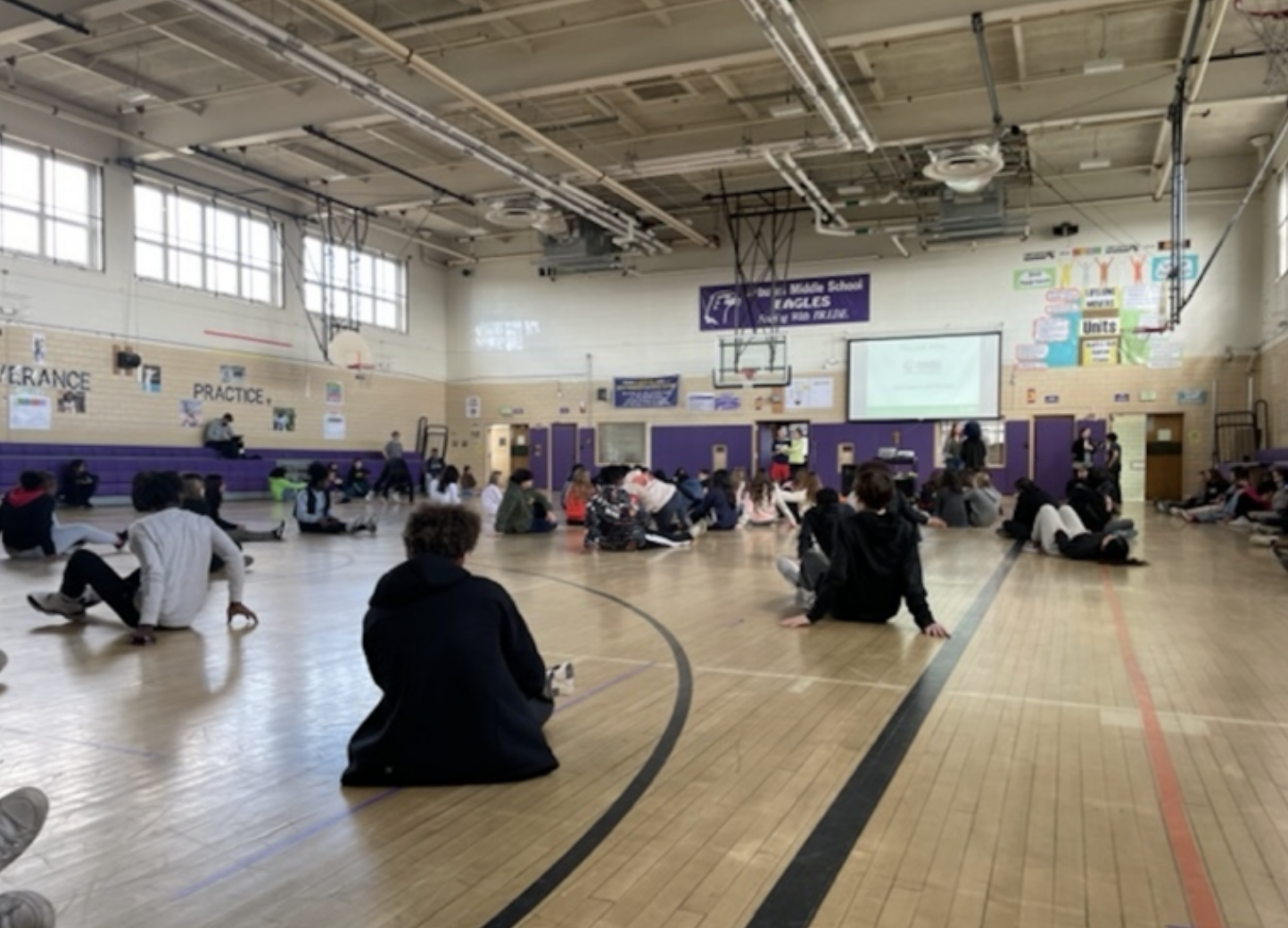
Keeping it real with kids and their mental health
NAMI presenters visit eighth graders near Baltimore to have an honest conversation about mental health.
This story is from The Pulse, a weekly health and science podcast.
Find it on Apple Podcasts, Spotify, or wherever you get your podcasts.
Earlier this year, the eighth graders at Arbutus Middle School in Baltimore County, Maryland shuffled down the long hallways and entered the gymnasium for their first assembly since COVID-19.
It seemed like they were either wearing crocs or fancy sneakers, hoodies or jean jackets. They plopped on the gym floor in clusters and whipped out their phones, but not for long.
They were instructed to put phones in the bin being passed around or put them away completely for the next hour.
“Don’t think I won’t catch you looking at your phone. Because I will. I always do,” said Jason Weiner, the health and physical education teacher.
“You know what this assembly is about,” Weiner said, trying to get the students to settle down. “We talked about it. It’s a presentation about mental health and mental health awareness.”
Meanwhile, NAMI Metro was getting set up with microphones, speakers, and a video projector. NAMI is the National Alliance for Mental Illness. They’re a national grassroots advocacy group with local chapters. Thousands of volunteers work for NAMI and two of them were in the gym about to present the “Ending the Silence” program.
“Ending the Silence,” is kind of like an interactive TED talk. But the storytellers share their lived experiences with mental health conditions. And they tell their stories directly to students. The national program has been around for a while but started in the Baltimore area in 2019. The organizers had no idea how relevant it would become.
According to a 2021 survey from the Center for Disease Control and Prevention, 44% of teens in the U.S. report feeling persistently sad and hopeless since the COVID-19 pandemic began. That’s up from 37% in 2019.
In this 2022-23 academic year, the local NAMI chapter brought 28 volunteers to 39 schools in the Baltimore Metro area to present “Ending the Silence.”
At Arbutus Middle School in late January 2023, the two presenters were Ken Cannon and Stephanie Schaffer. Cannon was a newbie to this experience. This was only his second time recapping his very personal, very hard journey. But he recaps his life and tells the 150 eighth graders about his family; their history with mental illness and how no one discussed it. He experienced his first bout of serious depression in college. Ken described what it looked like, who he spoke to, how that went, and what he does now for his personal mental health: therapy, medication, exercise, his personal coping skills and how he knows when he needs some extra help.
The students were perfectly still and quiet.
Next up was Stephanie Schaffer. Schaffer was not a newbie. She’d done this a few times and it was obvious. She’s a natural public speaker. When she told her story, she walked around, asked the crowd to chime in now and then. She shared various stages of her struggles and didn’t sugarcoat the toughest parts. She was sexually abused as a child, she was bullied by students and teachers in a predominantly white, rural county. Schaffer is multi-racial.
Schaffer opened up about her stays in mental health hospitals. She described her various psychiatrists each with their own diagnosis for her, and she talked about her therapy as well as group therapy.
The students sat through the assembly — so quiet, they seemed almost spellbound.
But when Schaffer brought up the topic of suicide, hands started popping up. And the questions poured in:
“What happens when you call [the suicide hotline] 988?”
“What’s a mobile crisis unit?”
“What happens when they take you to in-patient?”
“Do they take your phone?”
Schaffer handled each question as honestly as she could. She’s an open book of information with “real world experience,” and the eighth graders seemed hungry for the information.
“What’s being in the hospital like?”
“When someone in your life dies by suicide, how does that affect you?”
The assembly ended but the students were still chatty. Several walked up and asked Schaffer and Cannon follow-up questions. Questions, it seemed, they’ve been holding onto.
It’s hard to find someone who can field all those questions — and not go into lecture mode, worry mode, panic mode, or parental mode.
“I think that’s why I’m always willing,” said Schaffer, “because many people won’t talk about those things.”
